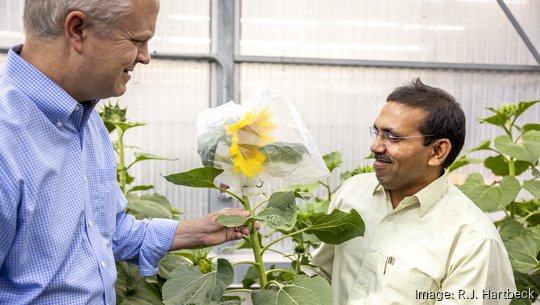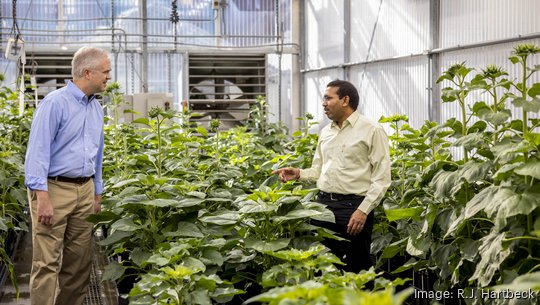
David Woodburn, CEO of St. Louis-based agtech startup Edison Agrosciences, vividly remembers the first time he saw a commercial sunflower field. It was years ago, during a road trip through South Dakota, and he recalls being struck by the flowers set against a bright blue sky. Yet despite how memorable the experience was, it would be many years before he’d come to understand the plant’s full power — one that is poised to solve one of the most vexing problems in the U.S. supply chain.
“There are over 2,000 plants that naturally produce rubber, and sunflowers are one of them,” Woodburn says. “If we could just make them produce a little more natural rubber, we could leverage what we already have in place so they would be a commercially viable domestic source.”
Like Woodburn, Matt Crisp and Thomas Hohn have been in awe of the sunflower for many years — pretty much from the moment they learned of the plant’s potential as a game-changing resource. In 2013, the pair co-founded Edison Agrosciences with the goal of using biotechnology and plant genomics to increase the natural rubber that the sunflower already produces, hoping that this increased yield would lead to a commercially viable solution for a problem that has plagued the domestic supply chain for as long as rubber became an important commodity.
As Crisp explains, this is something that’s been on the minds of inventors all the way back to Thomas Edison (hence the company’s name), who began working on the project for Henry Ford. Ford was looking for a domestic source of natural rubber for his namesake automobile company, hoping to secure the product for his vehicles’ tires so that he didn’t have to rely on foreign producers, something that he felt placed the automobile industry in a vulnerable position with regard to supply chain disruptions and shifting geopolitical conditions.
The concerns Ford had roughly a century ago have only grown in significance over the years. According to Edison Agrosciences’ research, the U.S. consumes approximately $2.2 billion in natural rubber per year for products that include everything from airplane tires to medical equipment to yoga mats. None of that supply comes from North America.
“It’s the second-most imported commodity behind oil,” Crisp says. “Our original founding thesis was that we have this crop here (that is) already in production and that produces rubber. If we could breed this crop for this very valuable characteristic, we would be addressing all these risks.”

Crisp and Hohn knew that plant genomics and the biotech industry held the key to unlocking the sunflower’s potential as a domestic natural rubber source, and for the past decade, their company has been dedicated to finding solutions to increasing its yield — a quest that moved to St. Louis in 2015 thanks to organizations like BioGenerator, a local biotech incubator that is helping to build the area’s innovation economy. Edison Agrosciences was one of BioGenerator’s portfolio companies, and after they helped Edison secure a grant, Crisp understood that the area was actually the best place for the company to grow and thrive.
“There are synergies to be had here with the (Donald) Danforth Plant Science Center, talent and early-stage capital from BioGenerator, and other sources that have helped our company grow and maintain its research programs,” Crisp says. “There’s also been enough innovation here — we’re not only hiring folks from Monsanto anymore, but the ecosystem has really grown through investment. There’s been a critical mass that’s really been an asset here.”
Woodburn echoes Crisp’s sentiment, noting that in the seven years he’s been in St. Louis, he’s seen tremendous growth in its innovation ecosystem. Crisp and Woodburn are banking on the fact that the innovation ecosystem here will help propel Edison Agrosciences past its early-stage status — and so far, they have seen that evidence play out as the company edges closer to proof of concept.
As Woodburn explains, their recent research successes show growth from being able to increase the sunflower’s rubber yield on a small scale to translating this to more meaningful quantities that they can use for samples to provide to companies eager to find a more stable source of such a valuable commodity. Woodburn feels that within the next 12 months, this increase in scale will lead to collaborations between Edison Agrosciences and industry players that will only accelerate the company’s quest to make domestic natural rubber a reality.
Explore more stories of St. Louisans who are paving the way for agtech careers for the next generation.
STLMade is a movement within the St. Louis metro that shines a light on the amazing things our innovative, tenacious, big-hearted people are doing. It’s supported by a region-wide collaboration of residents, local leaders, institutions, organizations, businesses and nonprofits helping to tell our story – that St. Louis is a place where you can start up, stand out and stay.



